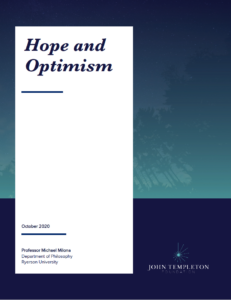
What are the benefits shown by the science of optimism and hope? Human beings are ambitious and goal-oriented creatures. Many, for example, aim at stable and fulfilling careers, good health, and happy families. Some also pursue broader aims, such as social justice, technological progress, or scientific discovery. But with such ambition comes adversity. When our central aims come under threat, as they inevitably do, we often find ourselves pessimistic or fearful. Despair might threaten to take hold. It is thus tempting to look to hope and optimism as ways of withstanding, or even smothering, these negative emotions. But should we?
Because both are distinct, their respective advantages and disadvantages are best explored separately. In this review, Professor Michael Milona of Ryerson University begins with the science of optimism and moves subsequently to the science of hope. It can likewise be misleading to talk about whether both are good “on the whole.” Such abstract pronouncements obscure the differing roles that they play in distinct aspects of our lives. Consequently, the review focuses on the functions of hope and optimism in different domains, including, for instance, healthcare, education, and politics.
The primary subject of this review is the Hope and Optimism Initiative, a $4.5 million grant from the John Templeton Foundation led by researchers at Notre Dame, Cornell, and the University of Pennsylvania. This grant also supported numerous sub-projects for scholars working around the world. The aim of the project was to explore the nature and benefits of hope and optimism from philosophical, theological, and empirical perspectives. The white paper covers the results of research on hope and the science of optimism.
Read the full white paper on Hope & Optimism written by Professor Michael Milona of Ryerson University.
Read “Finding Hope When Everything Feels Hopeless” by Elizabeth Bernstein for The Wall Street Journal. (October 27, 2020)
Discover our other research papers on discoveries. Explore topics such as:
